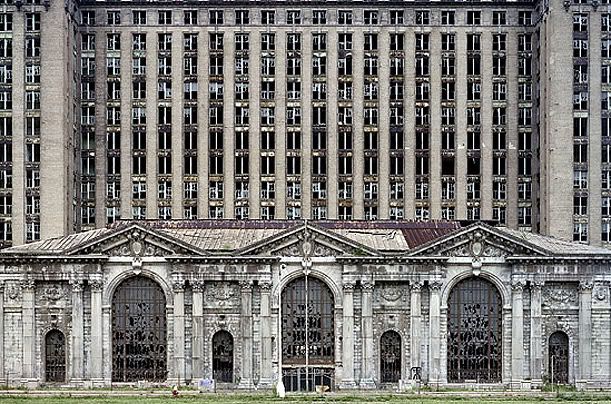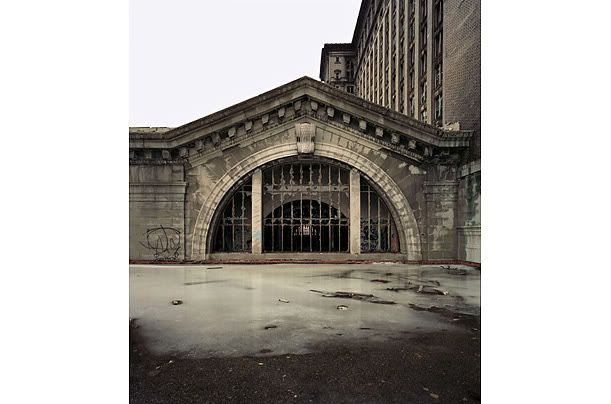
Several decades ago, Detroit's city fathers fathered a development called the Renaissance Center. Today, Detroit's urban core looks like a renaissance, all right -- of Berlin in 1945. It is the very symbol of a failed city. I don't know what, if anything, can be done to revive it. But Bruce Katz and Jennifer Bradley, writing in The New Republic, think they do.
Before getting into their prescription, let me acknowledge that as leftist periodicals go, The New Republic is sane, even when it's wrong. It generally steers wide of the kind of hysteria and fanaticism so often found in "progressive" publications and blog sites. If the writing tends to the academic, it at least shows evidence of thought.
The Katz and Bradley piece, while reasonably argued within its own premises, shows how entrenched in the liberal mind are certain notions that seem never to change. Here are some quoted excerpts to show you what I mean. The boldface emphasis is mine.
Leadership in suburban counties that is willing to collaborate closely with the city. Get real. Those suburban counties are populated largely by people who move there to escape the tar pit that is the central city. Here's a cell phone -- call someone who cares. Of course, to our authors, those suburbanites, many of whom are struggling like the rest of the country in the Great Recession, are "the rich." They should give till it hurts.
Before getting into their prescription, let me acknowledge that as leftist periodicals go, The New Republic is sane, even when it's wrong. It generally steers wide of the kind of hysteria and fanaticism so often found in "progressive" publications and blog sites. If the writing tends to the academic, it at least shows evidence of thought.
The Katz and Bradley piece, while reasonably argued within its own premises, shows how entrenched in the liberal mind are certain notions that seem never to change. Here are some quoted excerpts to show you what I mean. The boldface emphasis is mine.
This year alone, at least 48 Detroit public-school employees have been investigated for fraud--which might help explain why only one in four high school freshmen ever receives a diploma.It might, or it might not. Presumably those fraudsters were guilty of embezzlement or something on that order. I suspect few if any stole the students' schoolbooks or their teachers' chalk. Perhaps the result has more to do with the students themselves, their lack of future-time orientation, and their subculture with its contempt for learning. But Katz and Bradley would probably say that's "blaming the victim."
Institutions developed at the height of Detroit’s postwar prosperity remain--and provide the city with advantages that similarly depressed industrial cities cannot claim. It has educational institutions in or near the city (the University of Michigan, Wayne State) and medical institutions (in part, a legacy of all those union health care plans) that are innovative powerhouses and that currently generate private-sector activity in biomedicine, information technology, and health care management.Institutions. Always institutions. Leftists have faith in groups, official bodies, organizations. They may well be an asset, but since they have been operating all along, they don't seem to have done much to stop Detroit's slide into destitution.
And there is already a smattering of examples of old industrial outposts that have reacquired relevance. An old GM plant in Wixom has been retrofitted to produce advanced batteries. There’s a new automotive-design lab based in Ann Arbor. And Ford, the most promising of the Big Three, has made a decisive shift toward smaller, cleaner cars.That, too, is fine. But it hasn't helped so far. How many people from the central city will a few auto design labs employ? Can battery makers replace car makers as a driver of prosperity? Smaller, cleaner cars may be good for the country, but what's good for the country isn't necessarily good for Detroit.
Retooling Detroit’s old industries and advancing its new ones will take public money, and the feds are the only ones with money to give these days. But Washington already spends heavily on Detroit--$18.4 billion went to the city and the surrounding county in 2008.Wrong. "The feds" have no money to give these days. First, the feds cannot give money of their own, only money they have extracted through taxes -- including taxes on companies. Second, even the cutpurse government is broke, bankrupt, in debt to the tune of $13 trillion and counting (not including the cost of future entitlement programs).
A better return on federal investments will take a functioning local government as well as leadership in suburban counties that is willing to collaborate closely with the city. And, with so much sclerosis, change will only emerge with a strong hand from above.A strong hand from above. A mighty fortress is our God, the government.
Leadership in suburban counties that is willing to collaborate closely with the city. Get real. Those suburban counties are populated largely by people who move there to escape the tar pit that is the central city. Here's a cell phone -- call someone who cares. Of course, to our authors, those suburbanites, many of whom are struggling like the rest of the country in the Great Recession, are "the rich." They should give till it hurts.
State and federal governments should place the city’s most dysfunctional agencies in receivership ... These higher-level governments should also insist that the city and its suburbs end their wasteful bickering and act as one on issues that naturally cross borders, like transportation and the environment.If you can't work it out, Motown and 'burbs, the higher-level government's gonna insist. History has many examples of what happens when higher-level governments insist.
Because of the current credit desert, these companies should receive low-interest loans that allow them to reconfigure their plants to produce parts that can be sold to the international auto market--or for other types of machinery. And local government (or NGOs, even) can play the role of industrial planner. That is, they can look across the map and find instances where research institutions and manufacturers should collaborate on new ventures.Industrial planning. We've read about that, although maybe schools don't teach it these days. A certain regime was keen on five-year plans. Leftists believe only chaos can result if individuals, or groups of individuals, find their own solutions. The answers, to be valid for them, must come from politicians, bureaucrats, committees, think tanks -- anyone but the people being planned for.
European cities faced a similar challenge. After decades of population and job loss, they were saddled with an excess of housing and too much unproductive, polluted, or vacant land. This derelict land was as much an economic problem as a physical one, depressing property values and repelling new investments. So these cities reconfigured themselves into denser communities ...Leftists hate "wasted" space around people's homes. The residents are anti-social, anti-community for wanting some land of their own. They must be re-educated, gathered into "efficient" high-rises.
This physical regeneration, much more than economic reorientation, is where governments have a major role.Where don't they, in the new republic?
The great object lesson is Bilbao, Spain. As in Turin, leaders--in this case, the Basque regional government, worried about the condition of its largest city--created a master plan and two public-private agencies to support it, one of which, Bilbao Ria, focused specifically on managing large-scale land-cleanup-and-revitalization projects.Government again. Master plan.
The new Detroit might be a patchwork of newly dense neighborhoods, large and small urban gardens, art installations, and old factories transformed into adventure parks.Bring the kids to Blightland! Have fun wrench tightening at the Assembly Line Castle! Ride to the top of the smokestack! It's a pall world after all.
... The Obama administration is weighing a high-speed-rail plan that would link Detroit to Chicago and other Midwestern cities.What will it do for passengers after the one-way traffic ends?
The federal government could support the physical regeneration of Detroit by footing the bill for the development of a new city plan focused on reconfiguring land uses and economic activity around the reality of population loss. More radically, the feds could overhaul that tired cliché of urban policy: the community-development block grant. They should require Detroit and other cities to use these grants (and other federal, state, and local resources) for reclaiming, reconfiguring, and reusing vacant and abandoned land and housing.This whole article is a tired cliché of urban policy. Big Daddy government; tax money given to Detroiters with certain, er, requirements. Katz and Bradley's vision isn't just straight from the ivory tower. It's immoral. It's an imposed design using other people's money, funneled through institutions, destined to further central government control. Nobody had to dump grants and funding into the city to make it once the Mecca of American industry. If Detroit can't fix itself, it doesn't deserve fixing. Cities, like people, sometimes need tough love.





8 comments:
Agree with your conclusions 100%.
I'm picturing the legions of people in their 20s and 30s who passed through the various public policy graduate schools whose worldview is intimately tied up in these kinds of government solutions to every problem. First, there doesn't seem to be a "problem" in the world that they don't think government should fix. And their solutions are so deadly tiresome, so old, so worn-out....how can adults continue to believe in these same ineffective shiboleths? They're convinced that if they just put their smart policy heads together they will come up with a program that will fix those people. And they never do. All my life they've been talking about the crisis in public education and every year they spend vast amounts of money on new programs and meetings and panels and white papers and then the next year it's the same problem.
I have a very liberal female friend, a woman in her late 40s, whose heart bleeds for all these liberal causes and who works in public schools. I pointed out to her the utter bankruptness of these liberal ideas, how they've never worked and yet keep being tried year after year, and asked her how she can defend spending more money on it all.
She said that I was right, it didn't seem to be working, but "we have to try."
So I guess it's sort of a religious sentiment with liberals. You can't just leave those inner city people to grow and learn and figure out their problems and their lives for themselves. You have to TRY something, even if you've tried it over and over for 50 years without changing a thing. You have to tax and spend, you have to TRY.
It wouldn't be an issue if they'd just spend their own damn money on these useless causes instead of dragging the rest of us into it.
The thing is, as you said, call someone who cares. I don't give two sh*ts what happens to inner city people anymore. I assume they are human adults who have brains and the capacity to think and act. If they don't, there's nothing I can do to help them. If they do, surely if they really cared to change their situations they could and would. They don't need grants and programs and panels and initiatives. They just need a significant percentage of their population who cares enough to organize themselves, teach their children, etc etc etc. All the stuff they need to do is widely known and the know-how is all available for free. All it takes is for them to do something about it themselves. But they don't, and no one else can fix that but them.
"these companies should receive low-interest loans that allow them to reconfigure their plants to produce parts that can be sold to the international auto market"...this would not, of course, increase worldwide auto demand, so the parts sold by these subsidized component manufacturers would be at the expense of the existing, unsubsidized component mfrs and their employees.
On the general issue of "industrial policy," see my post leaving a trillion on the table.
Thought experiment: switch the people of Detroit with the people of Stockholm. What happens?
It's the people. The people of Detroit are not capable of running and maintaining a nice Western city. It's reverting back to their natural capabilities.
The high speed rail is straight out of The Simpsons. During the town hall meeting in which the salesman (brilliantly voiced by the late Phil Hartman) convinces Springfield to build a monorail, Marge wisely objects, arguing that the roads and traffic lights need repair first. In song, Bart answers "sorry mom, the mob has spoken." Of course, the rail proves a costly disaster. New rails are always a sign of desperation.
What gets me is this comparison of Detroit with European cities. Are they serious? I travel often in Italy, Austria and Germany and can tell you those cities are high-tech marvels compared not to Detroit but to NY, LA or Chicago - our "success stories." I will not even mention the racial composition of Detroit versus Stuttgart.
Besides, the success of NY as a city, which is real, is premised on the absence of a plan; of the organic, chaotic, market-driven changes in neighborhoods. The sections that have been planned, like parts of Brooklyn, look like Detroit. Paris was well-planned by Hausmann but the plan left old Paris fairly intact. I venture to add that though Detroit is a French word, Detroit ain't Paris.
See this cool startup story and also the Theranos story linked in the comments.
I doubt that "industrial planners" would be very interested in supporting uncredentialed entrepreneurs like these two people.
As St-Exupery observed, there is no place for the watchmaker among the gears of the watch.
It's the jobs. Free trade is the name of the game for the parasites in DC, and free trade always means freely trading American jobs for foreign ones. Getting people to oppose free trade is easy; they already do. Like immigration, free trade is one of those issues that our masters don't really care to listen to us on.
Until we start making things again, then there is no purpose to places like Detroit. Every recession will just make it worse and worse until the place is little more than a shantytown.
There is actually still quite a lot of manufacturing in the U.S....but there are various public policies which have been extremely deterimental this industry and there are a lot more such policies in the works. Even more seriously, there are *cultural* attitudes which are very hostile toward manufacturing...I explore some of these in my post Faux Manufacturing Nostalgia.
I've just recently bought the book "The Ruins of Detroit" and my heart bleeds. It's not the material loss that gets me. When I was cleaning my sink tonight, I thought of those other women who cleaned all those (now) abandoned homes in Detroit. It isn't simply the automotive workers' legacy that has been destroyed in Detroit - it's the legacy of all those women who cleaned and kept their homes. All that ruined. Those schools, abandoned, as if in an emergency. We need to learn from this.
My brother lives in Ann Arbor. When I've visited him, I've gone to the modern shopping malls. I feel, now, like a traitor.
I've also visited Turin. A fabulous city. There is no comparison. In America people have to decide as one to take back the streets. And to move back into the center core. There is no other way.
Post a Comment